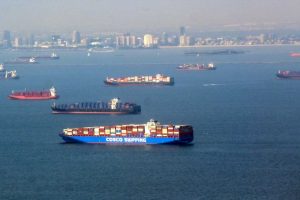California docks see 'significant progress' with supply chain backlog, port chief says

- Mario Cordero, executive director of the Port of Long Beach, cites "significant progress" at California ports.
- Cordero said that the twin ports of Long Beach and Los Angeles, which account for 40% of sea freight entering the United States, are working around the clock to offload containers.
- Since the announcement of the new fees, which have yet to be imposed, both ports have seen the lingering containers reduced by 33%.
WASHINGTON – The executive director of the Port of Long Beach said Wednesday that the twin ports in California are making "significant progress" in addressing the backlog of cargo ships and containers.
"I think we're moving forward with some progress and hopefully, as we move into the next six months we're going to continue to mitigate the scenario that we're seeing here," Mario Cordero, executive director of the Port of Long Beach told CNBC's Becky Quick on "Squawk Box."
Cordero said that the twin ports of Long Beach and Los Angeles, which account for 40% of sea freight entering the United States, are working around the clock to offload containers.
In order to address the backlog of container ships, congestion caused in part by a global shutdown following the coronavirus outbreak, the twin California ports announced unprecedented fees on shipping carriers.
The fines, which were announced in a joint statement from both port directors on Oct. 25, charge carriers $100 a day per container left on the dock. Carriers would have a maximum of nine days to move containers by truck before fines start accruing and six days if transporting by rail.
Since the announcement of the new fees, which have yet to be imposed, both ports have seen lingering cargo containers reduced by 33%. Cordero says there are still approximately 61 cargo ships off the California coast waiting to unload. That compares to a record 111 ships just two weeks ago, according to data from the Marine Exchange.
The fines, referred to as "Container Dwell Fees," came on the heels of the Biden administration's plan to run operations 24/7 at the ports of Los Angeles and Long Beach. Cordero says that while ramping up operations has helped relieve the logjam at the nation's busiest port complex, there are still other issues to address in the supply chain.
"There are truckers, marine terminal operators, warehouses, railroads and port authorities," explained Cordero, adding that a lasting solution would entail "a real collaborative effort" from all parties.
"That will take time but the good news is there's a very robust conversation with regard to the need to have a transformational change."
Source: Read Full Article
